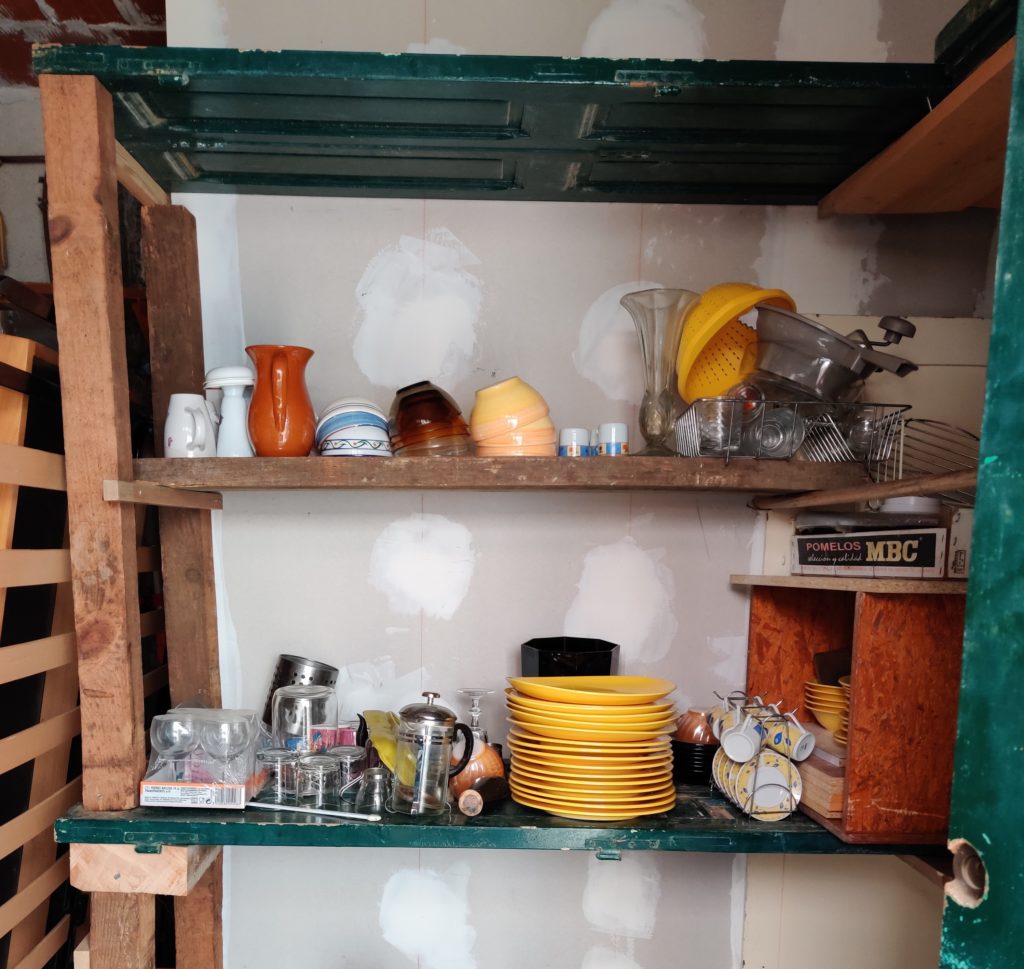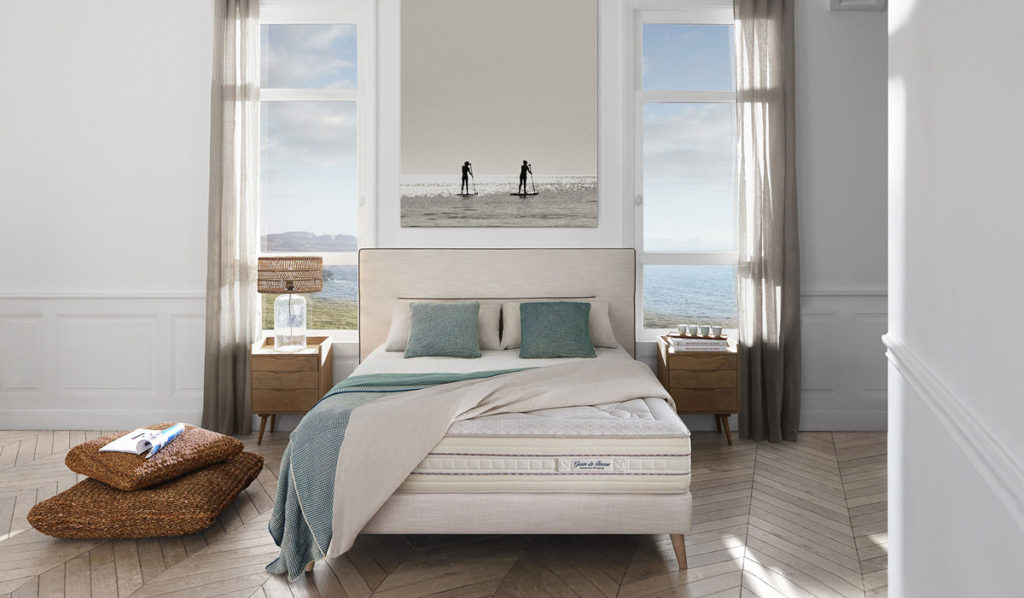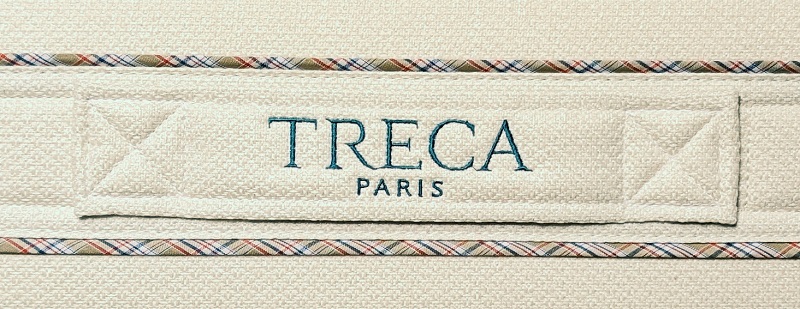In my renovation fantasy, we would continue to live in the exquisite and exquisitely small apartment in the centre ville until the refaire of the Ugly House was completed—light fixtures installed, molding painted, floors finished—but that would mean paying both rent and a mortgage, something we couldn’t afford. But before we could move into the ground floor, or, as we would come to think of it, Married Student Housing, we needed to buy a bed.
A lot of not-bad stuff had been left behind by the previous owners and I was thrilled to have it—a yellow-tiled trestle table, a brown pleather love seat, a wooden sideboard topped with the local rust-colored Vallespir marble. As the house had been two holiday rental flats, we were also bequeathed enough plates, bowls, and wineglasses to entertain the entire village. However, I drew the line at the mattreses, which, like used mattresses the world over, with their sad stains and saggy parts, carried the ghosts of bed-wetters, orgy makers, and possibly the tragic early death of a handsome poet/junkie.

A day before we were set to move, we went bed shopping. In our ignorance we expected to find a mattress, strap it onto the top of the car, and be sleeping soundly on it the next night. We drove to Porte d’Espagne, an unsightly shopping hub outside Perpignan. On the outskirts of every major city exists a cluster of big-box stores, home improvement warehouses, outlets specializing in bathroom fixtures, kitchen appliances, flooring, lighting, furniture, and imported knickknacks and throw pillows. I’m thinking that in France these massive circles of retail hell exist in order to contain aesthetic contamination, thus allowing the rest of the country to retain its elegance and postcard beauty.
The afternoon was hot and humid. We’d borrowed a friend’s car, and the air-conditioning blew warm air. We stopped at the first maison de literie we saw. After dutifully bonjouring the guy behind the desk, we wandered around, sitting on one bed after another, getting no sense whatsoever of what it might be like to sleep on them.
The expensive beds were in the back. Seeing us cruising among the high-end merchandise, the guy behind the counter roused himself and asked if he might help. He was tall and thin, and introduced himself as Steve. He asked who the bed was for. When we said “us” he suggested that we choose a bed with ressorts—bedsprings—because it would suit our “morphology.” French beds are infamous for being little more than futon pads. Presumably, the French are so small and thin their morphology does not require support. Jerrod and I burst out laughing and said, in our American way, “You think we’re fat!” Steve did contradict us, but continued with his examination. He asked how long we slept each night, in what position we slept, and whether we were the kind of sleepers who “tossed.“ I reported that I logged in a solid eight hours a night, slept on my left side, and did not toss. Jerrod said he slept six hours, slept on his back and both sides, and did indeed toss.
“I have just the bed for you!” Steve exclaimed, poking the air with a long forefinger. He led us to the second most expensive bed in the store, a Treca, a “couture bed,” made in Paris. “It is the bed in the Hôtel de Crillon and other five-star hotels of Paris,” he said. He provided us with pillows, and produced a fitted sheet (a drap housse, pronounced impossibly drah-ow-se) for us to recline upon.
As we lay there, he stood over us and expounded on the wonders of the Treca. I stared up into his perfectly oval nostrils as he waxed poetic about the special type of ressorts in the Treca, world famous for their strength and mobility and something I didn’t catch.
The Treca was comfortable. Steve wasn’t kidding about the world-class springs. It was completely out of our price range, then I thought: This is probably the last bed I’ll buy in my life, so why not? Also, the day before, friends gave us a refrigerator, thus freeing up about four hundred euros. We patiently waited for Steve to reach the end of his recitation, and said yes, we’d take it.

Wonderful! Steve said he could have it delivered in six weeks.
“Ah, bof,” said I, employing the multipurpose French word that means ugh, “we need it tomorrow.”
Credit where credit is due: Steve could have easily ended the conversation there. The French never seem to care about losing a sale, if it means getting to shrug and say “Ce n’est pas possible.” Instead, he fetched his boss, a young woman in low-slung khakis, a camp-collar style shirt of silky fabric, French-tucked into her khakis, and a pair of strappy sandals. She was chic, and spoke English. Steve explained our dilemma, that we were interested in the Treca, but that we were moving into our new house tomorrow, and we were in need of a bed, tout de suite.
Pas de problème! She had an idea. She had just received a new style of Treca, very firm, that morning. It wasn’t even out in the showroom yet. If we liked it, we could take it! It was a more expensive mattress even than the one we’d tried, but she would give it to us for the same price. We were thrilled. “Yes,” we said, “tout à fait! We want it! We’ll take it!”
However, there was no chance of short-circuiting the transaction. We needed to play our role. We needed to try the new mattress, and Steve and his boss (whose name I never learned) heaved the first mattress off the sommier (the equivalent of the American box spring) and replaced it with the new, more costly one, still encased in plastic. They spread out the protective drap housse, plumped up the pillows in their protective cases, and we lay down again. I looked up into Steve’s boss’s nostrils as she delivered the same speech about the wonders of the Treca, this time in English. We heard, again, about how the springs were manufactured and how the Treca beds were found in the Hôtel de Crillon. “And now,” I said, “in the Ugly House of the rue du Soleil as well!”
As they were ringing us up, Steve’s boss told us something else “very interesting” about the name of this particular Treca. “This mattress is part of the Les Cents Ciels collection. Les Cents Ciels means The One Hundred Skies, but it sounds the same as l’essential. L’essential les cents ciels!” It is a jou de mots, a play on words, do you see?
We did see, totally. The bed was delivered the next day, as promised.








